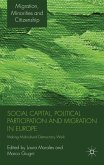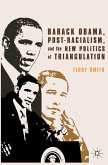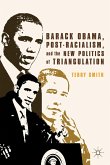This book is about the mundane, local, every day practices that constitutes democracy. Focusing on France and Finland, the book defines politicization as the key process in understanding democracy in different cultural contexts and shows a nuanced picture of two opposite models of European politics.
"Eeva Luhtakallio's book is a fascinating example of the fruitfulness of comparison when it goes beyond the sheer juxtaposition of two cases." - Community Development Journal
"This book will serve as a model for anyone who wants to do comparative research on political processes, from volunteering to activism to official state politics. Luhtakallio carefully excavates the historical, institutional and cultural differences between one nation's practices of democracy and another's, without becoming mired in a swamp of detail, and without reifying the 'culture' of the nations being compared. Its extraordinarily useful and innovative combination of ethnographic, visual, and interview-based research methods, exceptionally clear theory, and a lively writing style make this into a book that non-specialists will enjoy and specialists will need." - Nina Eliasoph, University of Southern California, USA
"Eeva Luhtakallio has set up a fine mirror towards the examination of two countries. The approach is ethnographic, and the viewpoint actor-centered. This is delightful and renders Luhtakallio's book an important and significant contribution to the field of political sociology that has not seemed this fresh and vivid for a long time. It is also a great step in developing comparative research." - Marja Keränen, University of Jyväskylä, Finland
"In this book, the main objective is to study citizenship with tools of pragmatic sociology 'in the making' and'from the grass roots', through a study of two local political scenes. The approach distinguishes itself as new and radical. The author shows equal familiarity with her two empirical contexts, and her mastery of the French context in particular is outstanding." - Loic Blondiaux, Université Paris I Panthéon-Sorbonne, France
"The crisis of democracy touches the entire modern society. Yet, new practices of politicization vary according to historical context and the sense citizenship isgiven in different societies. By way of an in-depth analysis of activist circles in Lyon and in Helsinki, Finnish sociologist Eeva Luhtakallio is able to grasp the dynamics and logic of these practices." - Linda Haapajärvi, La démocratie se faisant
"Eeva Luhtakallio's book is a fascinating example of the fruitfulness of comparison when it goes beyond the sheer juxtaposition of two cases. The result, far from providing the reader with 'portraits' of essentialized cultures, reaches far beyond the Finnish and French cases." - Catherine Neveu, Community Development Journal
"This book will serve as a model for anyone who wants to do comparative research on political processes, from volunteering to activism to official state politics. Luhtakallio carefully excavates the historical, institutional and cultural differences between one nation's practices of democracy and another's, without becoming mired in a swamp of detail, and without reifying the 'culture' of the nations being compared. Its extraordinarily useful and innovative combination of ethnographic, visual, and interview-based research methods, exceptionally clear theory, and a lively writing style make this into a book that non-specialists will enjoy and specialists will need." - Nina Eliasoph, University of Southern California, USA
"Eeva Luhtakallio has set up a fine mirror towards the examination of two countries. The approach is ethnographic, and the viewpoint actor-centered. This is delightful and renders Luhtakallio's book an important and significant contribution to the field of political sociology that has not seemed this fresh and vivid for a long time. It is also a great step in developing comparative research." - Marja Keränen, University of Jyväskylä, Finland
"In this book, the main objective is to study citizenship with tools of pragmatic sociology 'in the making' and'from the grass roots', through a study of two local political scenes. The approach distinguishes itself as new and radical. The author shows equal familiarity with her two empirical contexts, and her mastery of the French context in particular is outstanding." - Loic Blondiaux, Université Paris I Panthéon-Sorbonne, France
"The crisis of democracy touches the entire modern society. Yet, new practices of politicization vary according to historical context and the sense citizenship isgiven in different societies. By way of an in-depth analysis of activist circles in Lyon and in Helsinki, Finnish sociologist Eeva Luhtakallio is able to grasp the dynamics and logic of these practices." - Linda Haapajärvi, La démocratie se faisant
"Eeva Luhtakallio's book is a fascinating example of the fruitfulness of comparison when it goes beyond the sheer juxtaposition of two cases. The result, far from providing the reader with 'portraits' of essentialized cultures, reaches far beyond the Finnish and French cases." - Catherine Neveu, Community Development Journal








